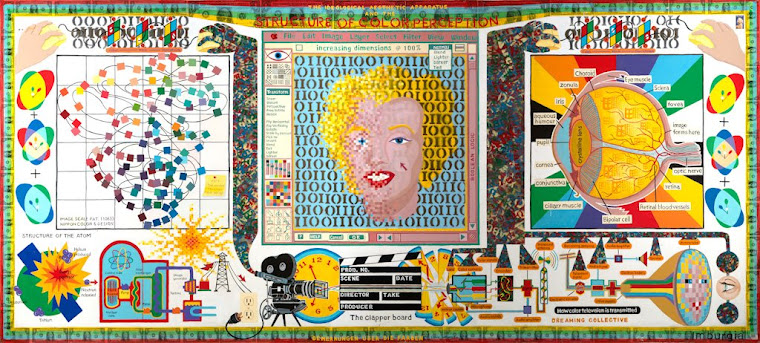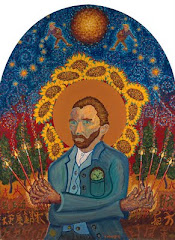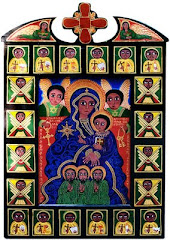Klediments: Frankenstein in America:
‘And his power of leading astray the inhabitants of the earth is due to the marvels which he has been permitted to work in the presence of the Wild Beast. And he told the inhabitants of the earth to erect a statue to the Wild Beast who had received the sword-stroke and yet had recovered.‘ The Book of Revelation 13:14
The man with the gun slung casually over his shoulder orders a ‘Carmel Macchiato’™ ‘COEXIST’ urges the bumper sticker on the electric Prius parked by the window. ‘Irony,’ David Foster Wallace says, ‘was just what the U.S. hypocrisy of the fifties called for.' I am reading a book of poetry by Gregory Corso and nursing a decaf ‘Americano.' ‘He that hath no sword,’ jesus commands, ‘let him sell his coat and buy one.' The man with the gun funnels his small change towards the tip jar. At the table on my right 3 evangelicals hold hands and thank Jesus for their muffins. ‘Irony,’ Hannah Arendt argues, ‘can be found in the laughter of death-camp survivors.' They are ‘Frankensteining Christ in America,’ Corso warns. ‘Be thankful in all things,’ I overhear an evangelical urge. It’s called an ‘Americano’ because during WWII american GI’s watered down their espressos quotes wikipedia. The man with the gun misses the tip jar and the coins clatter to the floor. Frankenstein’s stitches seem ready to unravel. The quiet man next to me looks up from his ‘USA Today,' His wife(?) talks loudly into her cell phone oblivious. The man with the gun bends over and gathers up the spilled coins, the barrel of his gun inadvertently sweeps the entire room. A quarter rolls under my table and I trap it with my foot. The quiet man reading the paper notices the man with the gun. ‘Frankenstein’ was the not the monster, as many believe, but his creator. Corso died of cancer in Minnesota instead of overdosing on tequila and dying alone in the desert. ‘Irony,’ says Hannah Arendt, ‘is an escape route from the dead ends of existing traditional conceptions of the world and the human being.' The man with the gun starts coming towards me. The woman on the phone says, ‘I have finally eliminated all my tan lines...’ ‘The great thing about irony is that it splits things apart,’ says Wallace. The evangelicals are taking turns reading aloud their favorite bible verses. ‘Beware; for I am fearless, and therefore powerful,’ boasts Frankenstein’s monster. “Nazi’s,” Hannah Arendt argues, ‘were quite ordinary and banal.' *Awesome* is the word most repeated by the evangelicals. I hand the man with the gun his quarter back and he thanks me politely. The woman on the phone is now intently watching the man with the gun. My father fought nazi’s at the battles of Anzio and Monte Casino.' ‘They are driving old ladies mad with Christ in America,’ Corso insists. The nazi’s drank their coffee in the same ways that the Italians did my father told me before wikipedia was invented. ‘Irony is the song of the prisoner who’s come to love his cage’ someone says. ‘The Word,’ an evangelical shares loudly, ‘became flesh and dwelt among us.‘ ‘Accursed creator!’ cried Frankenstein's monster, 'Why did you form a monster so hideous that even you turned away from me in disgust.' If nazi’s had watered down their coffee would Starbucks™ have labeled them *Nazianos?* The man with the gun hits his mark this time, the barista smiles nervously. The man who was reading the paper whispers something to his wife(?) while she furiously tweets with her thumbs. Adolf Eichmann, an architect of the holocaust, was a vacuum cleaner salesman. Some believe that a new sincerity may challenge the hegemony of metafictional and self-conscious irony. The man with the gun sits down next to the evangelicals. Galvanism is the contraction of a muscle that is stimulated by an electric current. ‘They are putting the fear of Christ in America,’ Corso exclaims. Eichmann declared himself a ‘Gottgläubiger’ just before he was executed. ‘Irony is useful for debunking illusions’ adds Wallace. ‘Lord, look, here are two swords,’ Peter says; and Jesus replies, ‘It is enough.' ‘I do know that for the sympathy of one living being, I would make peace with all,’ declares Frankenstein’s monster; ‘but I have love in me the likes of which you can scarcely imagine and rage the likes of which you would not believe. If I cannot satisfy the one, I will indulge the other.‘ ‘The U.S. constitution,’ says the man with the gun to no one in particular, ‘is a sacred covenant.' ‘Most of the illusion-debunking in the U.S. has already been done,’ says Wallace. ‘I came not to bring peace,’ Jesus exclaims, 'but a sword.’ ‘They are driving old ladies mad with Christ in America,’ Corso says. The woman is now videoing the man with the gun on her phone and posting it on facebook. ‘Our God’ squeals an evangelical, ‘is an awesome God.' ‘All sorrows can be borne,’ says Arendt, ‘if you put them into the form of a story.' ‘I am telling you the American way is a hideous monster,’ Corso declares. ‘If you do that which is evil,' cautions an evangelical, 'be afraid for he doesn't bear the sword in vain, Romans 13:4.’ ‘I was never an anti-semite,’ says Eichmann, ‘I was a nationalist.’ ‘If I cannot inspire love,’ says Frankenstein’s monster, ‘then I will cause fear.' The man and his comprehensively tanned wife(?) rush out and drive off in their Prius. ‘Most of the evil in this world,’ says Hannah Arendt ‘is done by people who never make up their minds to be good or evil.' ‘Satan has his companions to admire and encourage him,’ laments Frankenstein’s monster, ‘but I am solitary and detested.' The man with the gun finishes his macchiato with a loud ‘ahhh’ of satisfaction. ‘Irony,’ Hannah Arendt says, ‘involves holding more than one meaning in your mind at the same time which still makes people in America uneasy.' ‘They will fall by the edge of the sword,’ Jesus says, 'and will be led captive into all the nations.' ‘Life,’ proclaimed Frankenstein’s monster, ‘may only be an accumulation of anguish but it is still dear to me, and I will defend it.' ‘I am telling you the devil is impersonating Christ in America,’ swears Corso. ‘Germans liked to think of themselves as good people,’ says Hannah Arendt. ‘Simon Peter therefore, having a sword, drew it, and struck the high priest's servant.' ‘Irony’s gone from liberating to enslaving’ Wallace argues. The man with the gun stands up and announces to no one in particular, ‘Well, I guess it’s time for me to get to work.' ‘Postmodern irony and cynicism’s has become an end in itself, the problem is that once the rules of art are debunked, then what do we do?’ asks Wallace. ‘There is something at work in my soul, which I do not understand,’ confesses Frankenstein's monster. 'It is true that storytelling reveals meaning without committing the error of defining it,’ says Hannah Arendt, ‘storytelling brings about consent and reconciliation with things as they really are, and we may even trust it to contain that last word which we expect from the Day of Judgment.’ ‘Irony is an agent of great despair and stasis in American culture,‘ asserts Wallace. ‘All men hate the wretched; how, then, must I be hated, who am miserable beyond all living things!’ asks Frankenstein’s monster, ‘yet you, my creator, detest and spurn thy creature, to whom thou art bound by ties only dissoluble by the annihilation of one of us.’ ‘And at that very moment,' says an evangelical, ‘God turned his back on Jesus.’ And yet, I am still clinging to my religion, I thought out-loud to no one in particular.
Obliged.














